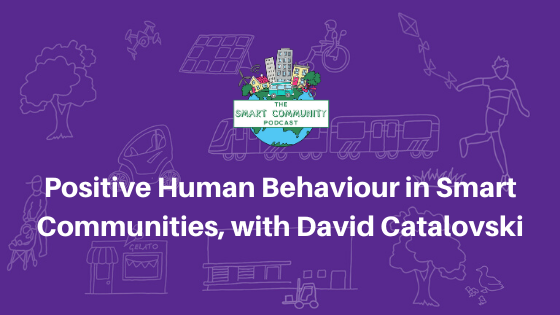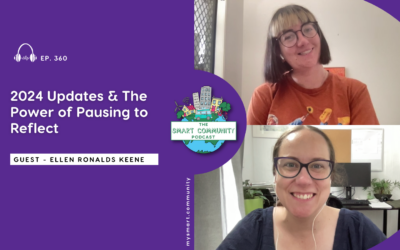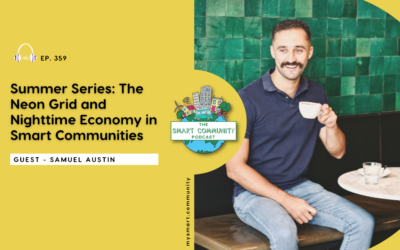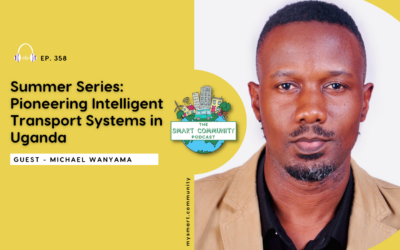In this episode I have a really fascinating conversation with David Catalovski, co-founder of GreenBe, a company that provides a cloud-based platform and solutions for government and utilities to drive smart technology adoption and hard-to-reach user behaviours. David and I discuss his background as a lawyer and what sparked his interest in the Smart Community space, and why he believes a Smart City is more about serving residents than any technology solution. David tells us about some of the projects he’s working on, including the work GreenBe has done with the City of Blacktown and how their services uses gamification to shift human behaviour in cities for the triple bottom line benefit.
We discuss why it’s so important for cities and government services to be benchmarking themselves against the service and engagement of private entities, plus the challenges of reinvention and keeping up with changing customer expectations. David and I touch on the future of work in local government, and the power of partnerships, collaboration and integration between cities and other organisations. We also have a really interesting conversation about the need for government to measure the amount of power any one company has, and how that goes hand in hand with our need for data literacy as consumers. We finish our chat discussing the emerging trends of shifting human behaviour to promote better engagement, better wellbeing and more community minded citizens. As always we hope you enjoy listening tot his episode as much as we enjoyed making it!
Listen here:
What we cover in this episode:
- David’s background as a lawyer and his passion for technology
- What sparked David’s interest in the Smart Community space
- Why David believes a Smart City is more about serving residents than about tech solutions
- The work GreenBe does using gamification to shift human behaviour in cities for the triple bottom line benefit
- How GreenBe’s work with the City of Blacktown has won awards
- Why it’s so important for cities and government services to be benchmarking themselves against the service and engagement of private entities
- The challenge of reinvention and keeping up with rapidly changing technology and customer expectations
- The future of work in local government and the skills we will need
- How Australia is embracing the Smart City concept and how that has accelerated in recent years
- The power of partnerships, collaborations and integration between cities and other organisations
- The need for government to measure the amount of power any one company has
- Data literacy and informed citizens who know their digital footprint
- The emerging trend of shifting human behaviour to promote better engagement, better wellbeing and more community-minded citizens
Quotes:
“Smart Cities is really about how governments can better connect with the citizens within their cities, and drive human behaviours and use solutions to drive those behaviors. Because when you look at a city, or actually the world, a lot of the impacts that are happening are [a result of] human behaviour…How can we incentivise or shift those behaviours?”
“It’s important for cities to benchmark themselves against technologies and services and solutions that we’ve all become accustomed to e.g. Facebook, Google, Amazon, Uber, Airbnb…Across the spectrum of services and touch points that we have with other entities or other organisations [including government]…Why should those solutions be so poor in terms of the [service]?
“[On 10 year plans] We don’t actually know what’s going to be happening in 2030. We might need to constantly reinvent ourselves every 24 months, or every 18 months, the way that technology is constantly evolving. That is really scary for a lot of organisations to constantly be at the forefront and the cutting edge of [that].”
“It’s something to celebrate in terms of shipping a product, sure. But you need to constantly be improving on it and capturing feedback on what your customers want and how you can better serve them with that solution.”
“Cities are a lot more than roads, rates and rubbish, I can assure you. We all have an impact when it comes to our cities, and our behaviours have an impact, and we interact with them on a daily basis.”
“It’s still the first or second over for what Smart Cities can potentially be.”
“If you handed over the keys to a city to a technology company, they would move at such a rapid pace. But obviously, the wheels in government don’t move as fast…That’s why things are still happening very slowly [in cities], but they are moving at a more rapid pace than they did 10 to 15 years ago.”
“Innocently enough, we’re giving away a lot of our data that we think is [used] for good, but it’s used kind of in other ways. It can have a potential global impact when you’re able to leverage that data…People need to understand how that data can be exploited.
Connect:
Find the full show notes at: www.mysmart.community
Connect with David on LinkedIn or via email david@greenbe.com
Connect with me via email: hello@mysmart.community
Connect with My Smart Community via LinkedIn or Twitter and watch on YouTube
Podcast Production by Perk Digital






0 Comments